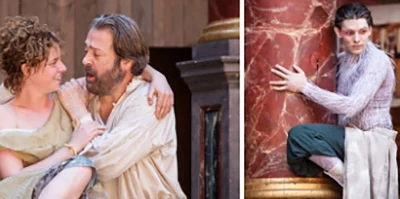The Tempest Review Shakespeare's Globe 2013
The anticipation of a new production of 'The Tempest' usually initiates in me a feeling of impending frustration. Why? Because the traditional view of this last of Shakespeare's triumphs is that it is a play about revenge. And a glance at the synopsis for this new version at the Globe Theatre, shows this idea has still not been eradicated. But even a brief skim-through of the first few pages of the text tells you that the main character in the play, Prospero, is only concerned about his daughter's future. Revenge might still be lurking in the dim recesses of his mind, but it has nothing to do with his motivations in the play.
To understand what I am getting at, you have to consider what kind of father Prospero has been, and his record is hardly impressive. In the father of the decade stakes, Prospero would undoubtedly come last. For the biggest part of his life, he has only been interested in acquiring knowledge about magic from his secret books. In fact, he was so obsessed with this that he put his brother, Antonio, in charge of running his Dukedom. Not surprisingly, his brother took the view that if Prospero wasn't going to have anything to do with running things, he might as well have the title and wealth for himself. So, one night, Antonio and his henchmen put Prospero and his young daughter, Miranda, on a boat and set it on a course to … anywhere. They managed to survive the voyage and landed on a magical desert island inhabited by a strange creature called Caliban, the son of a witch. Subsequently, Prospero and his daughter have been living on the island. But something has awoken Prospero's sense of parental responsibility. Now a teenager, Miranda has attracted the amorous attentions of the earthy Caliban, and it is this that has forced Prospero to re-examine his future and that of his child.
Even if revenge obviously still has a place in Jeremy Herrin's new production, it thankfully isn't unduly intrusive. In fact, it turns-out to be authoritatively directed with some well-devised and creative effects such as when the cast have to slide around the stage during the initial storm. Of course, at this venue, humour is important because it draws-in the audience, and that is no bad thing. 'The Tempest' has far more humour than one would imagine on a casual reading and Mr Herrin brings it out to great effect without making it seem as though every opportunity is being milked to death. In fact, much of the laughter from the audience surprisingly came at unexpected moments and not just those which are obviously staged for laughs.
The highly formal dress of the Neapolitan court contrasts well with the near thread-bare garments which Prospero and Miranda wear. In terms of the setting, there is a Swiss Family Robinson feel to the design with masses of wooden planks right round the back of the stage and a roughly-hewn staircase, and Prospero's cell is housed above the main acting area in the gallery. During the shipwreck, a large model boat flows onto the stage from the yard and then back down again as the vessel meets its demise during the storm. And puppets spring to life when Ariel sets skeleton dogs onto Caliban, Trinculo and Stephano, and the Neapolitan courtiers are set-upon by a giant bird-like harpy.
Roger Allam is in great form and totally in control of events as Prospero. I always think of Prospero as a non-worldly, bookish kind of individual who mostly wouldn't know the time of day, and Mr Allam ably suggests this aspect of the character. But he also makes it clear that Prospero is a man with a mission – to marry-off his daughter and get her safely back to civilisation and out of the hands of Caliban. Mr Allam also shows that Prospero has woken-up to his responsibilities as a father - there's a touching scene when father and daughter hug each other tenderly when Prospero is recounting their journey to the island.
Globe regular James Garnon, as Caliban, has more ape about him than the fishy nature which the text suggests. With a waddling, monkey-like gait and painted the same colours as the surrounding rocks (and the pillars of the Globe's stage) there's a sense that this Caliban is somehow more of the earth, than the sea. That didn't seem inappropriate. More significantly, Mr Garnon convincingly describes Caliban's dilemma – on the one hand, he wants to butcher Prospero and challenges him whenever he can, but he also understands Prospero's power and thus has to back down when faced with impending retribution. It is a stunning and compelling performance - one of the best Caliban's I have seen. In other roles, Jessie Buckley is the tomboyish Miranda who is truly amazed when she first sets eyes on other mortals; Joshua James is the King's son, Ferdinand, who awkwardly performs chores to prove his love for Miranda; and Colin Morgan is an efficient, alien-like, frock-wearing Ariel.
Though the notion of revenge has obviously not been completely banished from this production, I never found myself declining into despair. On the contrary, with two very fine performances from Roger Allam and James Garnon, and pretty-much seamless and inventive direction, there is much to admire and a great deal of fun to be had too.
Originally published on
